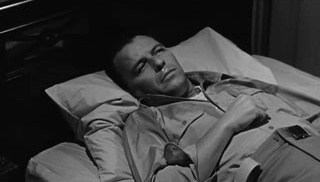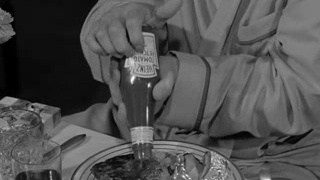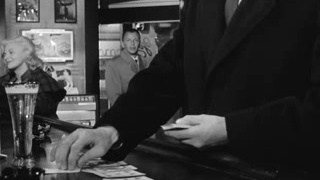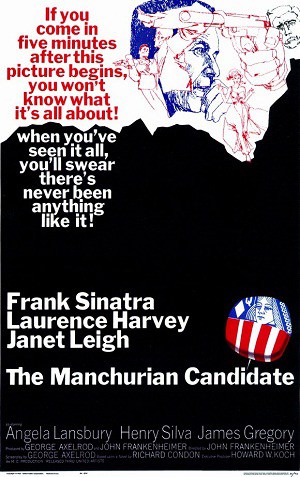An idea once unbelievable. . . .
Then unthinkable. . . .
Now all too possible. . . .
A chilling classic.
In the recent war in Iraq and the current one in Afghanistan, the greatest threat and concern has been and is—torture. Although torture had also been a concern in the Korean conflict, larger still perhaps was the threat of brainwashing. While Seven Days in May (1964) is centered on a planned military takeover of the U.S. Government, The Manchurian Candidate (1962), both directed by John Frankenheimer, is about a possible political coup of the government. By assassinating a presidential candidate, a Soviet operative in the U.S. hopes to make way for a Communist nominee and, conceivably, the future president. This is accomplished through the programming—the brainwashing—of an American soldier who had fought in Korea.
After their brainwashing sessions by the Communists in Manchuria, three released prisoners return to the States. One, Captain Raymond Shaw (Laurence Harvey), arrives a hero, recipient of the Medal of Honor, and is greeted at the airport by his mother, Eleanor (Angela Lansbury), and his stepfather, the U.S. senator John Yerkes Iselin (James Gregory). Eleanor is manipulative and domineering, her second husband a wimp, easily stage-managed. Raymond’s feelings toward his mother are unhesitating and succinct: “I didn’t always hate her. When I was a child, I only kind of disliked her.”
 The second returning soldier is Major Bennett Marco (Frank Sinatra). It is when the third, Corporal Allen Melvin (James Edwards), shares with him a recurring nightmare of his brainwashing ordeal that Marco senses that something isn’t right. “I tell you,” he says to his boss in Army Intelligence, Colonel Milt (Douglas Henderson), “there’s something phony about me, about Raymond Shaw, about the whole Medal of Honor business.”
The second returning soldier is Major Bennett Marco (Frank Sinatra). It is when the third, Corporal Allen Melvin (James Edwards), shares with him a recurring nightmare of his brainwashing ordeal that Marco senses that something isn’t right. “I tell you,” he says to his boss in Army Intelligence, Colonel Milt (Douglas Henderson), “there’s something phony about me, about Raymond Shaw, about the whole Medal of Honor business.”
Add to these suspicions and anxieties, Marco has experienced the same nightmare, over and over, every night. He is impassively witnessing an equally impassive Shaw, both obviously deep into their indoctrination, shoot dead a fellow American soldier (Tom Lowell) upon the instructions of a Korean interrogator, Dr. Yen Lo (Khigh Dhiegh).
Further, Marco feels he has been programmed. When asked his opinion of Shaw, he automatically replies, “Raymond Shaw is the kindest, bravest, warmest, most wonderful human being I’ve ever known in my life.” Corporal Melvin says the exact same thing when asked about Shaw. Marco knows better: “It isn’t as if Raymond’s hard to like. He’s impossible to like! In fact, he’s probably one of the most repulsive human beings I’ve ever known in all of my life.”
 Running counter to this story line but much intertwined with it, is Senator Iselin’s political career and, in McCarthy-like announcements, his claim that there are a such-and-such number of Communists in the U.S. Defense Department. But the exact number varies with each cue from his wife—now 207, later 104, then 275—until finally, during a meal, an exasperated Iselininsists that they agree on a number. At the time, he is putting ketchup on his steak from a Heinz 57 Varieties bottle. It’s decided: in his next public announcement—there are fifty-seven Communists in the Defense Department.
Running counter to this story line but much intertwined with it, is Senator Iselin’s political career and, in McCarthy-like announcements, his claim that there are a such-and-such number of Communists in the U.S. Defense Department. But the exact number varies with each cue from his wife—now 207, later 104, then 275—until finally, during a meal, an exasperated Iselininsists that they agree on a number. At the time, he is putting ketchup on his steak from a Heinz 57 Varieties bottle. It’s decided: in his next public announcement—there are fifty-seven Communists in the Defense Department.
In a film with little humor, this is a welcomed light touch, though Dr. Lo wittily plays with American slang and makes fun of the financial system of capitalism.
 Believing his growing suspicions have a connection with Raymond, Marco befriends him. Soon after, a bizarre incident occurs. At a bar where the two are to meet, and before Marco arrives, Raymond overhears the bartender say to a patron, “Why don’t you pass the time by playing a little solitaire?” Raymond promptly asks for a deck of cards and begins playing. Marco enters as the bartender continues, “Why don’t you go and take yourself a cab to Central Park and go and jump in the lake?”
Believing his growing suspicions have a connection with Raymond, Marco befriends him. Soon after, a bizarre incident occurs. At a bar where the two are to meet, and before Marco arrives, Raymond overhears the bartender say to a patron, “Why don’t you pass the time by playing a little solitaire?” Raymond promptly asks for a deck of cards and begins playing. Marco enters as the bartender continues, “Why don’t you go and take yourself a cab to Central Park and go and jump in the lake?”
At that moment, Raymond has dealt the Queen of Diamonds. He abruptly rises, walks out of the bar, hails a taxi, is driven to Central Park, walks across a pier to a lake—and, clothes and all, jumps in. Read More
